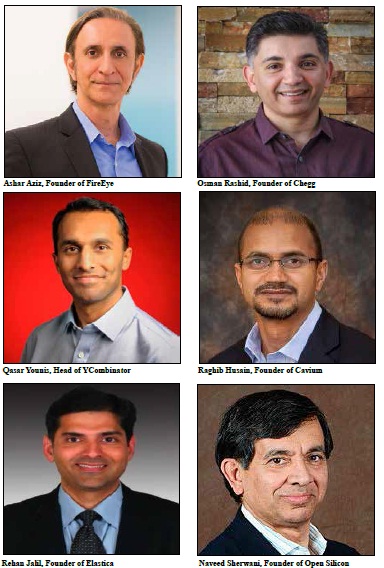Pakistanis Are Silicon Valley's Largest Foreign-Born Muslim Group
By Riaz Haq
CA

Pakistani-Americans are the largest foreign-born Muslim group in San Francisco Bay Area that includes Silicon Valley, according to a 2013 study. The study was commissioned by the One Nation Bay Area Project, a civic engagement program supported by Silicon Valley Community Foundation, The San Francisco Foundation, Marin Community Foundation and Asian Americans/Pacific Islanders in Philanthropy.
Overall, US-born Muslims make up the largest percentage at 34% of all Muslims in the Bay Area, followed by 14% born in Pakistan, 11% in Afghanistan, 10% in India, 3% in Egypt and 2% each in Iran, Jordan, Palestine and Yemen.
Silicon Valley Pakistani-American by the Numbers
There are 35,000 Pakistani-born Muslim in San Francisco Bay Area, or 14% of the 250,000 Muslims who call the Bay Area home, according to the study . Bay Area Muslim community constitutes 3.5 percent of the area’s total population and is one of the highest concentrations of Muslims in the country.
As of 2013, South Asian Muslims, including Pakistanis, have the highest income levels, with nearly half (49%) of them having a household income above $100,000. In comparison, those groups with the lowest proportion of household incomes above $100,000 were Hispanic Muslims (15%), Afghans (10%), and African American Muslims (10%).
The Bay Area Muslim community is very diverse in terms of race and ethnicity:
South Asians (30%)
Arabs (23%)
Afghans (17%),
African Americans (9%)
Asian/Pacific Islanders (7%)
Whites (6%)
Iranians (2%)
Based on the survey findings, the majority of Muslims live in the following three counties:
Alameda (37%)
Santa Clara (27%),
and Contra Costa (12%)
Pakistani-American Techies
Thousands of Pakistan-born techies are working at Apple, Cisco, Google, Intel, Oracle and hundreds of other high-tech companies from small start-ups to large Fortune 500 corporations. Pakistani-Americans are contributing to what Erik Brynjolfsson and Andrew McAfee describe as "The Second Machine Age" in a recent book with the same title.
Pakistani-American entrepreneurs , advisers, mentors, venture capitalists, investment bankers, accountants and lawyers make up a growing ecosystem in Silicon Valley. Dozens of Pakistani-American founded start-ups have been funded by top venture capital firms. Many such companies have either been acquired in M&A deals or gone public by offering shares for sale at major stock exchanges. Organization of Pakistani Entrepreneurs (OPEN) has become a de facto platform for networking among Pakistani-American entrepreneurs in Silicon Valley.
Pakistani-American techies presence in Silicon Valley has been recognized in a popular HBO show called "Silicon Valley" that stars a Pakistani actor Kumail Nanjiani playing a Pakistan-born Silicon Valley techie.
Silicon Valley's biggest tech start-up incubator Y-Combinator is now headed by Qasar Younis , a Pakistani-American born in the Pakistani village of Lala Musa. Younis was a keynote speaker at the Pakistani-American entrepreneurs conference called OPEN Forum 2016 just last month in Silicon Valley.
Islamophobia in America
Muslim-Americans, including Pakistani-Americans are thriving in the high-tech Bay Area in spite of the recent rise of Islamophobia in parts of America where the Republican presumptive nominee Donald Trump appears to be popular.
But Muslim-Americans cannot afford to ignore the gathering clouds of Islamophobia and xenophobia in America. The economic difficulties of many Americans are being exploited by demagogues like Donald Trump who is blaming foreigners for their unemployment and underemployment which can be traced to the twin forces of automation and globalization.
First, it was the manufacturing jobs that moved offshore in the 1980s and 1990s in an effort to save costs and fatten profits. This forced many factory workers to move into service industries and take pay cuts. Now the service sector jobs are also falling prey to outsourcing and automation.
Instead of addressing the root causes of economic difficulties faced by many Americans, Republican front-runner Donald Trump's presidential primary campaign is blaming immigrants and Muslims for their problems. This is giving rise to forces of racism, bigotry, xenophobia and Islamophobia in America.
Summary
It's in the best interest of Silicon Valley entrepreneurs, particularly Muslim-American entrepreneurs, to pay attention to the economic difficulties being faced by many Americans who are losing jobs to automation and globalization. These difficulties lie at the root of growing xenophobia and Islamophobia. The Muslim-American entrepreneurs need to think of new ways to help people who are being left behind. They need to explore ideas such as helping build new skills needed for the new economy, promote policy discussions on the idea of universal basic income and expansion of safety nets and development of new gig economy to ensure full employment with decent incomes. Failure to do so could lead to significant social strife and cause irreparable damage to the very foundations of the system that has brought great wealth and power to America as a nation.

